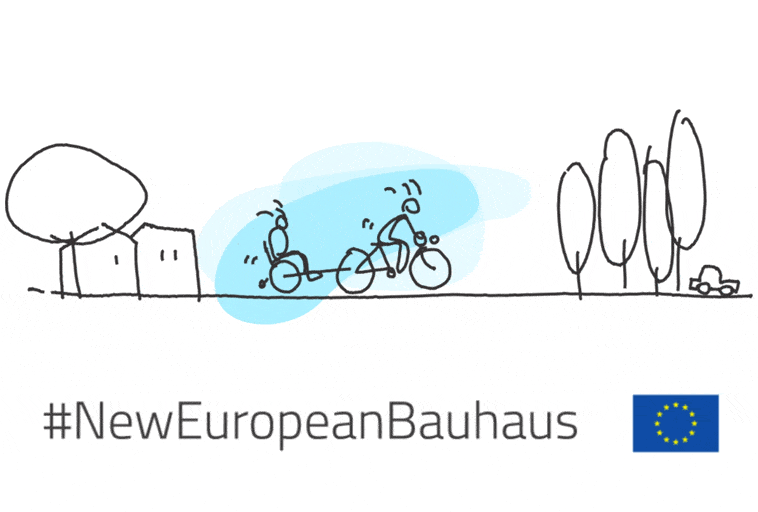
New call for funding & tenders by New European Bauhaus and HORIZON
»Support the deployment of lighthouse demonstrators for the New European Bauhaus (NEB) initiative in the context of Horizon Europe missions«
Save the dates:Planned opening date: 28 September 2021.
Deadline date: 25 January 2022 17:00:00 Brussels time
With the the new call »Support the deployment of lighthouse demonstrators for the New European Bauhaus initiative in the context of Horizon Europe missions« the HORIZON programme encourages entries that are deploying mission-oriented pilot projects that will act as ‘lighthouse demonstrators’ across the territory of the European Union and Associated Countries. They should embrace the key principles of the NEB initiative (sustainability, inclusion and aesthetics), using architecture, design and culture as core resources for a sustainable society, and the mission-oriented approach (impactful, measurable, targeted) in an innovative and exemplary manner.
This action will offer opportunities to engage with communities on an environmentally sustainable, socially fair, and aesthetically appealing transition, using architecture, design and culture as core resources for a sustainable society.
Proposals are expected to demonstrate all of the outcomes listed below:
- The projects should have a clear expected transformational impact both on the built environment, and on how people live and interact in that environment. The pilots will fully embrace the mission objectives and NEB principles, acting as “lighthouse demonstrators”, serving as test-beds for the implementation of Horizon Europe mission objectives and innovative solutions.
- Deliver, by the end of the project, ‘tangible’ and replicable results, leading to benefits in the long-term.
- The grants leading to the design and deployment of the initial implementation phase are meant to catalyse substantial additional investments (e.g. partnerships of national, regional, local public and private sources, including EU Structural Funds) to ensure the implementation of the full-scale project after the design phase.
- A clear demonstration effect in relation to the operationalisation of the triangle of sustainability, inclusion and aesthetics, serving as reference for the broader implementation of the NEB initiative, as well as for the uptake and support of the Horizon Europe missions by national, regional and local authorities, other stakeholders, and European citizens, thus enabling a rapid scale-up of Horizon Europe missions’ activities.
This action will contribute to the Delivery Phase of the NEB, by deploying mission-oriented pilot projects that will act as ‘lighthouse demonstrators’ across the territory of the European Union and Associated Countries. They should embrace the key principles of the NEB initiative (sustainability, inclusion and aesthetics), using architecture, design and culture as core resources for a sustainable society, and the mission-oriented approach (impactful, measurable, targeted) in an innovative and exemplary manner. They should address one or more relevant challenges that represent the wide scope of the NEB initiative, such as:
- Environmental and climate adaptation challenges, environmental and climate risks, prevention and resilience
- Economic and territorial changes linked to the green transition
- Social challenges (poverty, segregation, social exclusion, etc.)
- Challenges linked to the use, preservation and reconversion of existing infrastructure and heritage
- Demographic challenges (ageing, migration, depopulation, changes in property market due to tourism, etc.)
Proposals should include:
- The development of an ambitious, mission-oriented, quality co-design process, based on citizens’ and stakeholders’ participation and multidisciplinary (e.g. arts, architecture, design, heritage, engineering, physical and spatial planning, manufacturing, technology, environmental and social sciences, etc.) and multilevel collaboration (e.g. civil society, public and private actors), also capable of addressing the relevant objectives of the Horizon Europe missions.
- An ambitious and credible executive plan that identifies and analyses the challenges and resources of a given territory (e.g. neighbourhood, district, ecosystem) in terms of sustainability (in line with the European Green Deal), inclusiveness (including accessibility and affordability) and aesthetics (including functionality, comfort, attractiveness, etc.).
- The detailed outlined, through feasibility studies, of highly innovative, cutting-edge solutions, associating meaningful, inclusive social purpose with strong aesthetic values and sustainability, in line with the European Green Deal, to address emblematic environmental and societal challenges at the territorial level.
- Deployment of an initial set of solutions as demonstrators within a two-year timeframe, accompanied by a rigorous impact evaluation methodology, measuring the impact of the adopted methodologies. Involvement and testing of the demonstrators with international experts.
- A detailed roadmap for implementation, with a sustainable financial plan quantifying and identifying substantial additional investment based on involvement and partnerships with different actors (national, regional, local, public and private sources).
- Evidence of developed relationships and partnerships with responsible authorities and/or representatives (on planning, permits, property rights, financing, impact assessments, etc.).
- Exchange and dissemination of co-design methodology at European Union and Associated Countries level.
- Contribution to the outreach, dissemination and communication strategy and plan of the NEB and of Horizon Europe missions.
- The NEB initiative, launched in late 2020, will undergo rapid development in an open community. Potential applicants are invited to join this community under [https://europa.eu/new-european-bauhaus/index_en] to contribute to the discussion on the application of the NEB principles in the 21st, and their role in the twin green and digital transitions, and recovery from the COVID-19 crisis.
- Projects are expected to participate in European-level networking opportunities in the context of the NEB initiative.
Cross-cutting Priorities:
Societal EngagementSocio-economic science and humanitiesCo-programmed European PartnershipsSocial InnovationFind out more here: https://ec.europa.eu/info/funding-tenders/opportunities/portal/screen/opportunities/topic-details/horizon-miss-2021-neb-01-01
